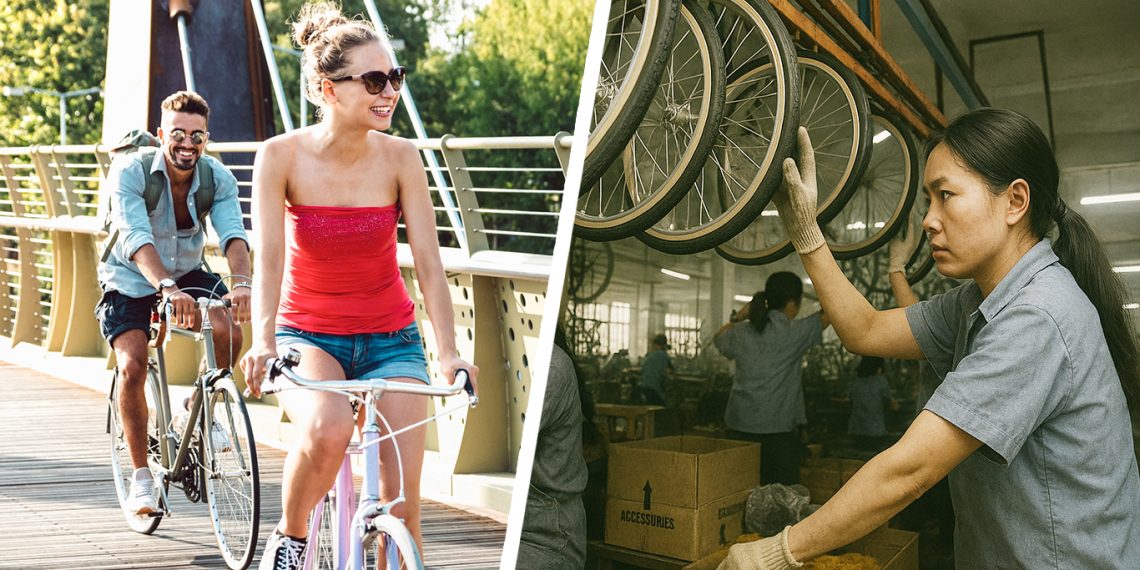The bicycle industry is booming. But how are the bikes that help reduce traffic and protect the climate actually made? Major brands like Bianchi, Canyon, Centurion, Giant, and Merida accept exploitation in pursuit of profit. As uncovered by an investigation by Le Monde Diplomatique, thousands of migrant workers in Taiwan’s factories are subjected to forced labor. They are burdened with debt owed to recruiters, stripped of their passports, and live in rat-infested accommodations.
The global bicycle market, valued at approximately 66 billion US dollars (as of 2024), is a billion-dollar business. Le Monde Diplomatique has investigated what lies behind the industry’s shiny facade: working conditions in Taiwan’s bicycle parts factories that the International Labour Organization (ILO) classifies as forced labor.
Recruiters Charge Workers Thousands in Fees Before They Even Begin
Taiwan has become a hub of global bicycle manufacturing, particularly in the city of Taichung. Many of the world’s leading bicycle brands—Bianchi, Canyon, Centurion, Giant, Merida, Pinarello, REI, Scott, Specialized, and Trek—have been manufacturing bicycles or parts in Taiwan for years. Around 40 percent of all bicycles exported to Europe come from there, with the Netherlands, Germany, and the United Kingdom being the primary importers.
Manufacturers like Giant, Merida, and Maxxis operate production facilities in Taiwan and, alongside various suppliers, employ thousands of migrant workers from Vietnam, Indonesia, Thailand, and the Philippines. These workers produce bicycle parts and tires, often under exploitative conditions.
Desperate for employment, these workers are recruited through agencies that charge them exorbitant fees—often several thousand dollars—just to secure a job. This amount is more than many workers will earn over several years.
The fees vary by country of origin. Interviewees told Le Monde Diplomatique that Filipino workers were charged $1,500 to $1,700, while Vietnamese workers paid up to $6,000.
Indebted Workers Left Without Passports
To pay these high recruitment fees, workers must borrow money from banks or relatives even before they begin work. In many cases, they are forced to take out loans with exorbitant interest rates, trapping them in a cycle of debt bondage.
Victims also report being deprived of their freedom: their passports are confiscated, and they are sometimes not allowed to manage their own wages.
Rats in Dormitories and Wage Deductions for Minor Infractions
The consequences of these practices are far-reaching. Workers describe dismal living conditions in overcrowded and unsanitary dormitories provided by the companies. Rats are reportedly common between the beds. Minor violations of company rules can result in wage deductions.
The bicycle manufacturers’ responses to the revelations were mixed. Some, like Giant, have promised to end the collection of recruitment fees for new workers starting in 2025—though only for new hires. Giant has also pledged to stop withholding wages.
Some European brands, such as Bianchi and Canyon, have announced that they will no longer tolerate recruitment fees and plan to improve working conditions. However, the issue of debt bondage among thousands of existing workers remains unresolved.
Two suppliers of the German bicycle and automotive tire company Continental have compensated their workers with over 3 million US dollars following Le Monde Diplomatique’s publication.
International Cycling Community Less Outraged Than Expected
Other companies, including Merida, have refused to commit to ending these practices or providing retroactive compensation. Debt bondage remains a persistent issue across the industry. Two U.S. manufacturers, Specialized and Trek, remained silent for months after the revelations.
Not a single bicycle manufacturer has committed to ensuring that migrant workers are reimbursed for the fees they paid.
Moreover, international cycling events and teams sponsored by these brands have reacted with surprising restraint. According to Le Monde Diplomatique, critical coverage—such as during the Tour de France or Giro d’Italia—is virtually nonexistent. Major brands produce racing bikes, and trade magazines rely on advertising revenue from these companies.
Corporations and Taiwan’s Government Benefit from Exploitation
Companies like Merida and Maxxis have profited from exploitative practices for decades, as has the Taiwanese government—for example, the state-run postal service holds shares in Giant. The EU and the U.S. have already taken steps: Starting in 2027, the EU will ban the import of goods produced with proven forced labor—a regulation already in effect in the U.S., which applies even on the basis of suspicion.
Despite some improvements, working conditions in Taiwan’s bicycle industry remain a persistent issue. Recruitment fees and the resulting debt bondage continue to affect not only the workers themselves but also damage the reputation of the entire industry.
The rights to the content remain with the original publisher.



